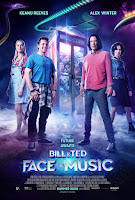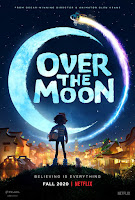blah.
Movies
Bill & Ted Face the Music (2020)
Like all of the Bill & Ted movies, this very belated threquel is genial and has some great bits, and it's clear that Keanu Reeves and Alex Winter are having a great time. Samara Weaving and Brigette Lundy-Paine are great additions, too, as Bill and Ted's daughters. But these movies have always been far better at incident that they are at plot, and this one leans way too heavily on plot for its own good—far too many schemes and villains and mythologies. It kind of bogs down the otherwise very enjoyable moments, like Mozart meeting Jimi Hendrix, Bill and Ted meeting themselves, and everything meeting Kid Kudi. Grade: B-
Dick Johnson Is Dead (2020)
I was going into this expecting that the whole movie would be the kind of tongue-in-cheek gallows humor described in the film's premise, where filmmaker Kirsten Johnson confronts her father's mortality by staging a bunch of imagined death scenes for him. And the movie's not not that, and a bunch of those scenes are pretty funny/engaging, if occasionally a little too mannered (I go back and forth on whether or not the sequences where she depicts her dad in heaven are moving flights of fancy or irritatingly twee). But I wasn't expecting that during the course of filming this movie, Dick Johnson would actually begin to succumb to dementia, and that aspect of the movie is absolutely gutting. I've seen several family members go through this (and I'm honestly terrified that I will, too, one day), and it's just a punishingly bleak thing to witness, to say nothing of how angry and scared the people actually losing their cognitive function feel as they descend into the fog. In that light, even the most twee aspects of the film become retroactively kind of rebellious: a furious refusal to let one of the worst parts of human aging steal her father's sense of play. Very moving. Grade: B+
Over the Moon (2020)
Really fascinating animation here, which was exactly what I was expecting from a feature directed by legendary Disney character animator Glen Keane. This is one of the only CG-animated movies that I've seen that uses the technical tools of CG—lighting, surface texture, etc.—as techniques not for photorealism but for achieving these impossible effects like having light come not from an external source but inside the characters themselves. The result is some really arresting, semi-abstract imagery that I dig quite a bit. The rest of the movie is not good, though. I guess it would make sense that Keane would care more about animation technique than narrative, but you'd think a few of the literally hundreds of people working on this film would have thought better than to try to cram every single trope of children's animated films into this movie. The movie is all over the place, introducing new conflicts while barely resolving the old ones, yearning desperately for its emotional beats to land without ever staying narratively still enough to give these moments any kind of firm footing. Some of the 2010s Disney animated movies suffered from a kind of modular storytelling, where the films' narrative approach is something like a perpetual present, where individual sequences work really well in isolation but have trouble creating a completely cohesive larger context, and Over the Moon (not a Disney movie, though certainly not for lack of trying) feels like the logical escalation of this trend, with a movie so focused on its own present that almost nothing connects to anything that just elapsed. It's really weird to be pulled along by a narrative like that, though it does work pretty well as a showcase for the animation, since it's literally the only thing I care about here. Grade: C+
Taylor Swift - Folklore: The Long Pond Studio Sessions (2020)
The interludes where Taylor Swift is talking with Jack Antonoff don't illuminate the songs on folklore nearly as much as this movie seems to think they do. Like a lot of great artists, as erudite a songwriter as Swift is, she's often not especially interesting to listen to talk about her own music. But folklore is one of my favorite albums of the year, and this movie was a major good vibe because of that. I need good vibes these days, so thank you, Taylor Swift. Grade: B
The Monkey King (aka Havoc in Heaven) (aka Uproar in Heaven) (大闹天宫) (1961)
I don't think I've ever watched a Chinese animated feature before, so I was basically going in blind to this one. But man, I sure got lucky, because this rocks. A revisionist take on the early part of Journey to the West that foregrounds the monkey Sun Wukong as this agent of pure chaos—like, this movie is basically wall-to-wall antics and mayhem that give a gigantic middle finger to the divine hierarchy ruling over the world, which is consistently hilarious and entertaining while also making sense as a product of a Chinese society on the eve of Mao's Cultural Revolution. On top of this, there's some seriously lush animation, and I love the way that the film moves in this constant dance with the almost constant accompaniment of the traditional Chinese music in the score. Something I don't think people talk enough about is how animation completely revolutionized film's relationship with music; my son has been watching a lot of Bambi recently, and that movie's dynamic approach to music is so sophisticated and forward-thinking and like nothing else in live-action American cinema of the time. The Monkey King feels like it's doing something similar, basically making the score not just a mood but a lively participant in the film's action, a spry partner to the visuals. Anyway, this is very good. It would have been even better if some of the fight scenes were maybe a tad shorter (I watched the 114-minute cut, so maybe I'd think the more widely available 90-minute cut is superior?), but as an introduction to Chinese animation, I think this served me pretty well. Grade: A-
P.S. I was part of a discussion about this movie on the Cinematary podcast. If you're interested, you can listen here.
Books
Paradise by Toni Morrison (1997)
So it's a novel about liberation ideology and the formation of a community over decades, which means it's absolutely up my alley. Whereas something like Beloved tries to embody history through individual characters, Paradise tries the opposite, using the collective evolution of the black-separatist town of Ruby as a synecdoche for the post-Reconstruction history of Black America. It's a fascinating, sometimes mysterious, often compelling work reminiscent of sprawling magical-realist history novels like One Hundred Years of Solitude and House of the Spirits, and there are sections of this that I would count among some of the best work of Morrison's career. The novel sometimes stumbles when it tries to scale down to the individuals that make up this town, though; the way the novel jumps throughout history has the effect of obscuring some character conflicts, particularly for characters who only directly show up a few times, like Dovey and Soane Morgan, who play pivotal roles late in the novel but remained something thin on the ground for me because of the relatively small amount they were engaged in the plot early on. Maybe a re-read would fix this, now that I'm familiar with the whole picture. Either way, it's a small gripe in an otherwise absorbing novel. Grade: A-






No comments:
Post a Comment